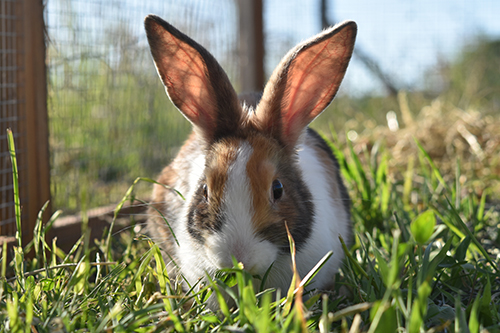
JackieLou DL from Pixabay
Rabbits are popular family pets, with around 1.5 million* in the UK and it is important that owners can recognise when their animal is in pain, and know when to seek help to protect their rabbit's welfare. New research by the University of Bristol Veterinary School has found the majority of rabbit owners could list signs of pain and could mostly identify pain-free rabbits and those in severe pain, but many lacked knowledge of the subtler sign of pain.
The study, published in BMC Veterinary Research today [27 March], provides the first insight into how rabbit owners identify pain and their general ability to apply this knowledge to detect pain accurately.
Rabbits are prey species and have evolved to hide signs of illness and pain. Recent research has developed pain scales for use by veterinary professionals - including the Bristol Rabbit Pain Scale (BRPS) - but to date research hasn't investigated rabbit owners' ability to recognise pain in their animals.
The study explored how owners identify pain in their pet rabbits and their ability to correctly spot different levels of pain, and to find out areas in which owners would benefit from education.
Owners were recruited via a variety of routes including Facebook and completed a two-part online survey. Part one collected data on demographics, owners' knowledge of pain signs and beliefs about pain in rabbits. Part two asked respondents to pain score eight videos, recorded during routine veterinary treatment, of rabbits in different levels of pain for comparison to pain scores made by three experts.
The researchers used a simplified version of the BRPS which involved a single 0 to 3 scale. The research team explored the number of pain signs each respondent could list, the total score given to the videos, and their difference from the experts' scores.
A total of 500 people completed part one of the survey and 345 completed part two. Respondents were mostly able to identify five signs of pain (such as anorexia, and changes in posture and movement), but many were less aware that decreases in grooming behaviour and changes to eye and ear position can also be signs of pain. Women, people who worked with rabbits, and those with experience of their rabbit having an operation recognised pain more accurately.
Overall, 98.6 per cent of respondents thought correctly that rabbits felt pain as much or more than dogs and cats. In part two, respondents more frequently agreed with the experts when identifying rabbits in no pain (88.8 per cent) and severe pain (65.2 per cent), but there was lower agreement when recognising mild (28.4 per cent) and moderate pain (43.2 per cent). Respondents overall rated pain lower than experts with an average total pain score of 11.9 compared to 18 given by the expert.
Dr Nicola Rooney, Senior Lecturer in Wildlife and Conservation at Bristol Veterinary School and corresponding author, said: "Most rabbit owners were able to list numerous pain signs and were generally able to recognise pain-free rabbits and those in severe pain. Owners' ability to differentiate between mild and moderate pain is more limited and they could benefit from training in the subtler signs of pain. Veterinary professionals should also be aware of areas where owners' knowledge can be improved."
Charlotte Forder, lead author, who conducted the study for her final BSc Veterinary Nursing and Bioveterinary Science research dissertation, added: "Our study highlighted a gap in the communication between owners and veterinary professionals. Speaking to, and advising, owners when animals are having procedures is important, so the animal has the best outcome. It is also a great opportunity for the veterinary community to educate owners about signs of pain in rabbits."
Paper
'An investigation into how accurately UK rabbit owners identify pain in their pet rabbits' by Charlotte Forder, Livia Benato and Nicola Rooney in BMC Veterinary Research [open access]






